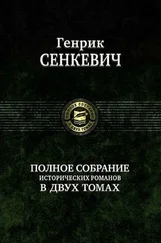Генрик Сенкевич - Whirlpools
Здесь есть возможность читать онлайн «Генрик Сенкевич - Whirlpools» — ознакомительный отрывок электронной книги совершенно бесплатно, а после прочтения отрывка купить полную версию. В некоторых случаях можно слушать аудио, скачать через торрент в формате fb2 и присутствует краткое содержание. Жанр: foreign_antique, foreign_prose, на английском языке. Описание произведения, (предисловие) а так же отзывы посетителей доступны на портале библиотеки ЛибКат.
- Название:Whirlpools
- Автор:
- Жанр:
- Год:неизвестен
- ISBN:нет данных
- Рейтинг книги:4 / 5. Голосов: 1
-
Избранное:Добавить в избранное
- Отзывы:
-
Ваша оценка:
- 80
- 1
- 2
- 3
- 4
- 5
Whirlpools: краткое содержание, описание и аннотация
Предлагаем к чтению аннотацию, описание, краткое содержание или предисловие (зависит от того, что написал сам автор книги «Whirlpools»). Если вы не нашли необходимую информацию о книге — напишите в комментариях, мы постараемся отыскать её.
Whirlpools — читать онлайн ознакомительный отрывок
Ниже представлен текст книги, разбитый по страницам. Система сохранения места последней прочитанной страницы, позволяет с удобством читать онлайн бесплатно книгу «Whirlpools», без необходимости каждый раз заново искать на чём Вы остановились. Поставьте закладку, и сможете в любой момент перейти на страницу, на которой закончили чтение.
Интервал:
Закладка:
"Yes," he said, "I would be delighted with such a home as a refuge from care and in it 'fresh, rosy and tempting cheeks' as an attraction."
Ladislaus, in his laughter, displayed his sound, shining teeth and answered joyously:
"Ah, how it does delight me! the soul almost squeaks."
And they both began to laugh.
"But," said Gronski, "one must be lucky enough to find that and courageous enough to win."
To Krzycki there suddenly came the recollection of a certain ball in Warsaw; of Panna Rose Stabrowska, her pensive eyes, and her white, half-childlike shoulders protruding from the net-lace like watery foam. He therefore sighed quietly.
"Sometimes," he said, "courage also is necessary to bridle one's self."
In the chamber for an interval could be heard only the measured tick-tack of the cumbrous clock and the wheezing of the asthmatic servant, who dozed, leaning against the sideboard.
The hour was late, Gronski rose and, having roused himself from a momentary revery, said, as if speaking to himself:
"And those ladies will be here to-morrow."
Afterwards he added with a touch of sadness:
"Ah, at your age it is not permissible to bridle one's self."
II
The ladies did actually arrive at Jastrzeb the next day about noon, followed immediately afterwards by Dolhanski, who did not, however, see them on the road, because at the station he became occupied entirely with the receipt of the baggage and therefore arrived in a separate conveyance. The guests did not find Krzycki at home. As the burden of the funeral, and all cares connected with it, fell upon him, he left an hour earlier for Rzeslewo. The obsequies were to take place at three o'clock. Ladislaus' mother arrived at the Rzeslewo church with Pani Otocka, Panna Marynia, and their friend Miss Anney. In the second carriage Gronski and Dolhanski came, while the third and last one brought the younger members of the Krzycki family, – eleven-year-old Anusia and Stas, who was a year younger, together with their French instructress and the tutor, Laskowicz. Pani Krzycki reminded her son of his feminine relatives and introduced him to Miss Anney, but he barely had time to bow and cast a glance at her when he was summoned away on some matter relating to the final funeral arrangements. Alighting from the carriage, the ladies could scarcely press their way into the church, although an effort was made to clear a path for them, for in the church and adjacent enclosure an unusual throng held sway. The greater landed gentry were represented in extremely scant numbers, as the deceased Zarnowski did not associate with any one, and besides Jastrzeb, Gorek, and Wiatrak, did not visit any of the manors in the neighborhood. In their place, the Rzeslewo peasantry appeared as one man, with their wives and children. The reason for this was that from some unknown source and for some inexplicable reason, a rumor circulated among them that the deceased had bequeathed to them his entire fortune. Quite a number stood outside the church fence, and their loud voices and anxious faces indicated the impression which the rumor of the bequest had made upon them.
After chanted vigils and a sufficiently long mass, white surpliced priests, preceded by a cross, appeared at the church doorway. After them the coffin was borne. The hearse stood ready to receive the remains, but peasants, in implicit faith of the bequest, lifted it upon their shoulders to carry to the cemetery, which was a verst distant and in which was located the tomb of the Zarnowskis. Gronski gave his arm to Pani Krzycki, Dolhanski to Pani Otocka, while the duty of escorting the light-haired Miss Anney fell to Krzycki. After an interval, the funeral cortege slowly proceeded in the direction of the cemetery.
From under the shade of church lindens it soon advanced upon the field-road, flooded with sunshine, and extended itself in a long line. At the head went the priests; after them the coffin, swung high up on the shoulders of the peasants; the relatives and guests followed, and after them came swarms of gay peasant national dresses and feminine handkerchiefs gaudily spotted with yellow and red colors, which glaringly contrasted with the green, sprouting spring corn. Church flags, with skulls and pictures of saints, floated heavily in the golden air and at times heaved with a flap when assailed by the wind. In this manner, glistening in the sun, the crowd approached the poplars which shaded the cemetery. From time to time the chant of priests resounded, breaking out suddenly and with great sadness. Nearer the cemetery the peasants commenced the litany and gusts of wind seized these Polish and Latin songs and carried them with the odor of candles, which were continually blown out, and the scent of the drippings of the torches to the forests.
Krzycki, who escorted Miss Anney, observed that her hand, which rested upon his arm, trembled considerably. It occurred to him that she probably had tired it, holding her parasol on the road from Jastrzeb to Rzeslewo, and he paid no more attention to it. In the conviction that such a solemnity as a funeral exempted him from starting the usual social conversation, he walked in silence. He was fatigued and hungry. Disordered thoughts rushed into his head. He thought of his uncle, Zarnowski, of his inability to mourn for him, of the funeral, of his newly-arrived cousins, and of yesterday's conversation with Gronski. At times he would gaze, abstractedly, at the near by fields and half-consciously would note that the winter-corn on the fertile Rzeslewo soil, as well as the spring grain, gave promise of a bountiful harvest. After a certain time he recollected that it would be proper for him to devote a little more attention to his companion.
Somehow, after a few stealthy glances, his curiosity, which thus far had been deadened by fatigue, hunger, and ill-humor, was awakened. The proximity of a woman, young and, as he observed, stately, began to affect him. It seemed strange to him in the first place that he was conducting over the Rzeslewo highway an Englishwoman, who came, the Lord knew from where; that a short while before he was unacquainted with her and at present felt the warmth of her arm and hand. He observed also that her hand, tightly incased in a glove, though shapely, was not at all small; and he thought that the reasons for this were the English sports-tennis, rowing, archery, and the like. "Our Polish women," he thought, "look differently." Under the influence of these reflections upon English sports, it seemed to him that from this quaintly attired form some peculiar power, healthiness, and energy emanated. His companion began to interest him more and more. Leading her on his arm, he could see only her profile, upon which he bestowed increased attention. As a consequence of more exact observation, his curiosity intensified. In the first moments he conceded only that she was a comely and buxom person, but later he soliloquized in this fashion: "How vastly more stately and, sincerely speaking, more beautiful she is than Pani Otocka or that child, whose dresses reach to her ankles and whose soul, as Gronski says, is in the violin!" But this, however, was not the strict truth, for Pani Otocka, a slender brunette with the expression of a blonde, was of a type more exquisite and racial, and the "child" had a countenance simply angelic. But at that particular moment, if a secret ballot had been taken upon this question, Krzycki, owing perhaps to his opposition to his mother's designs, would have cast his vote for Miss Anney.
After a certain time, it seemed to him that Miss Anney also was casting stealthy glances at him. He determined to catch her in the act and looked at her more openly. And then he saw something which astonished him in the highest degree. On the cheeks of the young Englishwoman tear after tear coursed. Her lips were compressed as if she desired to stifle her impressions and her hand, supported on his arm, did not cease to tremble.
Читать дальшеИнтервал:
Закладка:
Похожие книги на «Whirlpools»
Представляем Вашему вниманию похожие книги на «Whirlpools» списком для выбора. Мы отобрали схожую по названию и смыслу литературу в надежде предоставить читателям больше вариантов отыскать новые, интересные, ещё непрочитанные произведения.
Обсуждение, отзывы о книге «Whirlpools» и просто собственные мнения читателей. Оставьте ваши комментарии, напишите, что Вы думаете о произведении, его смысле или главных героях. Укажите что конкретно понравилось, а что нет, и почему Вы так считаете.









